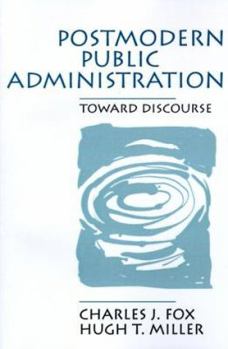Postmodern Public Administration: Toward Discourse
Select Format
Select Condition 
Book Overview
"This volume crisply reviews the phenomenological and linguistic turns in recent policy analysis." --S. Plotkin in Choice Charles Fox and Hugh Miller attempt to redirect current thinking about public policy and administration in light of the postmodern condition. Postmodern Public Administration rejects existing and accepted theories such as public management doctrine, constitutionalism, and communitarianism in favor of constructing a "discourse"...
Format:Paperback
Language:English
ISBN:0803958021
ISBN13:9780803958029
Release Date:November 1994
Publisher:Sage Publications, Inc
Length:192 Pages
Weight:0.70 lbs.
Dimensions:0.5" x 6.0" x 9.0"
Customer Reviews
3 ratings
excellent intro to postmodernism and democratic governance
Published by Thriftbooks.com User , 21 years ago
Please ignore the negative review of this book. The reader was obviously looking to be spoonfed. I am a current student of Dr.Fox and I find him very insightful and must say this book is very readable and lucid. Post-industrial societies have become increasingly postmodern. This transformation entails corresponding problems for both society and governance. FM explicate what these problems are what this means for the role of public administration in America. What makes this book valuable? It is able to explain many tenants of postmodernism, public policy theory, and democratic government (as well as what is wrong with them) in less than 100 pages. The first part of the book would justify buying it. Secondly, even in the face of the postmodern condition, FM give us a conceptual scheme of how democratic governance is possible. If you feel their discourse theory seems inadequate and impossible, think through some of the postmodern trappings and you may find this is the stepping stone for paticipatory based will formation that many falsely believe is still prevalent in America. A secondary benefit is that this book helps one to understand "postmodernism" in part, without reading pretentious texts from French intellectuals such as Baudrillard, Barthes, and Derrida. Finally, anyone familiar with most public administration theory will realize this is a god send. Most P.A and Org theory is to state lightly, a sophmoric effort at best. So to restate the obvious, buy it.
Fox & Millers Post modern Public Administration
Published by Thriftbooks.com User , 22 years ago
Few books have challanged the conventional wisdom in public administraion as well as this work. I have used this volumn at both Master,s and doctoral levels as a text. While it is a challanging "read" for some, it opens new vistas for many students. I concur with most of he review by Mc Swite (White & McSwain)and would add that it has become one of the most influential works in the subfield of public administration theory.Henry D. Kass,Professor Emeritus,Hatfield School of Govt. Portland State U.
From Public Administration Review
Published by Thriftbooks.com User , 24 years ago
Excerpt from review by O.C. McSwite . . . Fox and Miller draw on Habermas' theory of authentic speech acts and Arendt's idea of agnostic tension (there must be argument and struggle). Following these theorists, they propose that discourse must be sincere, intended to be relevant to the situation, characterized by willing (noncoerced, nonapathetic) attention, and must involve participants who are willing and able to make a substantive contribution (no free riders or fools allowed). These are what they call warrants for discourse, freely available to all. The idea seems to be that if involvement in policy making follows these guidelines or rules, it will, perforce, constitute legitimate governance through discursive democracy. In the book's final chapter, Fox and Miller use their model of discourse as a conceptual tool for assessing the efficacy of an array of real-world programs designed to employ discourse in governance. Their case analysis ranges from instances of elite-dominated manipulation at one extreme to expressionistic anarchy at the other. While they judge both these forms of participation to be democratic dead ends, they find hope or "intimations" in a few cases--for example, bioethical health decisions in Oregon, the Phoenix Futures Forum, the neighborhood health-care program studied by Cam Stivers--that discourse of the kind their model prescribes is possible. These projects had problems, but they also show possibilities. Such "nascent" forms of authentic discourse suggest that where democratic process approximates the out-lines of their model, it begins to achieve the structuration and coherence required of efficacious democratic discourse. As a final note, Fox and Miller prescribe a proactive role for public administration, whereby each administrator would capitalize on every opportunity to reach public action through a process of agonistic discourse with citizens. The key to administrators being able to achieve a proactive stance is that they must learn to listen, which is, of course, the core of the inclusiveness that their idea of discourse seeks. HIGHLIGHTS OF THE ANALYSIS: I mentioned that I found the critiques of the Blacksburg Manifesto and of communitarianism to be especially engaging and that the book's description of the post-modern political condition is one of the most cogent and gripping I have encountered. These were great highlights. The standout feature of the book, though, is the general integrity of its argument. I have used this book as a supplementary text in two of my graduate courses. While my students (most of whom had minimal exposure to philosophy of the sort employed in the book) often found the philosophical concepts and argumentation to be difficult, they were, nonetheless, thoroughly engaged and followed the argument well. I disagree with the suggestion that this book is thin on practical proposals. I came away from it, and certainly from my discussions of it with students, with a vividly clear idea of





